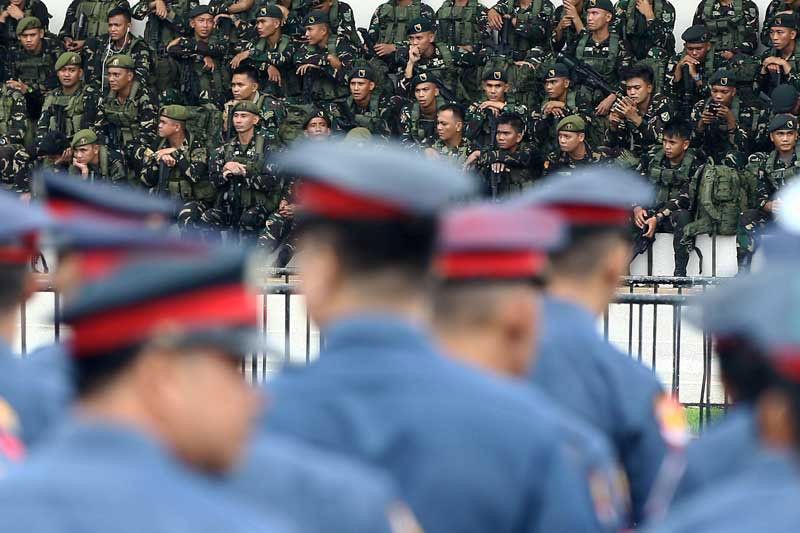PNP smells ambush; DND blames lack of coordination

MANILA, Philippines — Philippine National Police (PNP) chief Director General Oscar Albayalde is not discounting the possibility that soldiers ambushed the policemen in last Monday’s mistaken encounter in Samar, even as the military has insisted an apparent miscommunication led to the tragic incident.
Albayalde said it is one possibility being looked into by the PNP’s Board of Inquiry as investigators have established the soldiers fired from a higher vantage point.
“When you have the vantage position, you have the element of surprise. It’s part of combat tactics,” Albayalde said.
Defense Secretary Delfin Lorenzana said the lack of coordination on the part of the PNP with their Army counterparts led to the “misencounter.”
Lorenzana likened the incident to the firefight in Mamasapano, Maguindanao in 2015 where 44 police troopers were killed by Muslim rebels.
“What happened in Samar is just like in Mamasapano; lack of prior coordination. Initial report says that the PNP leadership in Samar made the coordination after their troops were already in the area or a little late because by then, the misencounter was already happening,” Lorenzana said.
Army troops mistakenly killed six policemen and wounded nine others who they thought were communist New People’s Army (NPA) guerrillas operating in the hinterlands of Sta. Rita in Samar.
The Armed Forces of the Philippines (AFP) said they are looking into operational lapses in last Monday’s bloody encounter.
Military officials said the initial findings indicate there was apparent miscommunication between troops and policemen in the area.
Albayalde, however, pointed out that the soldiers opened fire on policemen from a higher vantage point.
“They have the advantage so it’s like an ambush, although that is now being investigated. What we want to know is if they were aware the people they ambushed were policemen,” he added.
Maj. Gen. Raul Farnacio, commander of the Army’s 8th Infantry Division based in Samar, said the coordination by the police with them appeared to be “hazy.”
He said the policemen contacted the Army detachment commander in the area to inquire if there was an ongoing military operation in Sta. Rita.
Farnacio said troops from the 87th Infantry Battalion were conducting combat operations for the last six days in the mountains of Barangay San Roque at the boundary of Sta. Rita and Villareal town.
The military operation was in response to the repeated sightings of NPA rebels, he said.
On the other hand, police troops from the PNP’s 805th Regional Mobile Force Battalion were also pursuing the same NPA group. They initially inquired from an Army detachment in Barangay Anibongon to find out if there was an ongoing Army operation in San Roque.
“They only asked if there are military operations there. The detachment commander replied in the affirmative but the PNP only said ‘noted’ – they did not say if they are going in to operate in the (same) area,” Farnacio said.
Farnacio said the troops initially spotted three heavily armed men heading towards their location and they immediately maneuvered to take a higher vantage point.
He said the troops initially failed to identify the armed men because of their muddy uniforms. The troops had fired a “probing shot” to determine if the other contingent had reinforcements.
Immediately after the first shot rang out, the three men, who appeared to be acting as lead scouts, opened fire and were joined by the rest of their colleagues.
This triggered a 20-minute firefight that only stopped after both forces called their respective mother units and nearby detachments for reinforcements.
The troops and policemen then realized they were engaging each other after being informed by their respective mother units, Farnacio said.
What happened was not really an ambush, according to Farnacio, because no volume of fire was initially involved and fighting only developed when the policemen retaliated.
A PNP official privy to the ongoing investigation said some of the policemen were just 12 meters away from the soldiers’ position and the farthest was around 30 meters.
“The soldiers were also positioned on a higher ground,” the official pointed out.
PNP investigators were also determining if some of the fatalities were killed by sniper fire, he said.
Fog of war
The official said probers are also looking into the extent of coordination between police and military before the misencounter.
The official said they are investigating why the presence of policemen in the area was not relayed to the soldiers on the ground.
“The question is up to what level the coordination has reached. That is what we are looking into, what went wrong with the coordination,” Albayalde added.
“When you operate in areas that are rebel infested, coordination is very important,” he stressed.
Lorenzana, for his part, stressed that prior coordination of forces is important to accomplish a single mission.
He said prior coordination first requires the conduct of joint pre-planning conference to include the general area where the combat operation will be conducted.
It involves exchanges of maps where combined operating units will be plotting their movements and exchanges of radio frequencies by both operating forces so as to avoid bumping into each other.
Region 9 police director Chief Supt. Billy Beltran said there was apparent lack of coordination between the military and police forces in last Monday’s incident in Samar.
Beltran said the PNP is aware that the AFP has the primary role in internal security operations (ISO).
“And that is why before we (PNP) move for our ISO, whether it be a minor or major or whatever move in the particular area, we ensure that it is coordinated,” Beltran said.
He said the procedure is before the police forces start the mission, they call the operation center of their military counterpart to report a certain unit is on the ground.
In turn, their counterparts will alert their respective forces to hold or halt the operation because of the impending mission in a similar area.
“Or better still we make it a joint operation. In this case we can avoid that so-called fog of war,” Beltran said. – With Roel Pareño
- Latest
- Trending



























